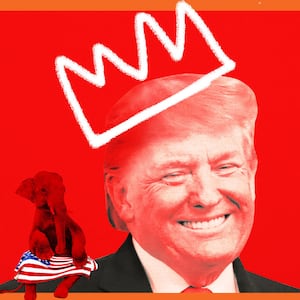President Donald Trump did not even wait until he announced the departure of Bill Barr from the Justice Department before piling pressure on his successor to probe discredited election fraud claims.
Emails turned over to congressional investigators show Trump and his aides, in the last days and weeks of his presidency, repeatedly tried to push Jeffrey A. Rosen, who became acting attorney general last December, to reopen an investigation into stolen election claims already thrown out by judges.
“These documents show that President Trump tried to corrupt our nation’s chief law enforcement agency in a brazen attempt to overturn an election that he lost,” Rep. Carolyn B. Maloney (D-NY), chair of the Committee on Oversight and Reform, said in a statement released Tuesday. “Those who aided or witnessed President Trump’s unlawful actions must answer the Committee’s questions about this attempted subversion of democracy. My Committee is committed to ensuring that the events leading to the violent January 6 insurrection are fully investigated.”
In one instance, Trump’s office sent false election fraud claims to two DOJ officials, then quickly announced that Attorney General Bill Barr—who had publicly contradicted Trump’s narrative—would be stepping down and that he was promoting the officials to the top two positions at the agency.
Shortly before 5 p.m. on Dec. 14, 2020, the day state electors would be certifying Electoral College votes, White House assistant Molly A. Michael emailed Rosen with the subject line “From POTUS.”
An attachment included wild—and bogus—claims about supposed voter fraud in Antrim County, Michigan. Three pages were devoted exclusively to talking points, which included arguments and counterarguments that beggar belief they actually came from a U.S. president: “This is a seditious conspiracy to undermine the election process and the will of the American people;” “a Cover-up is Happening regarding the voting machines in Michigan;” and, “Michigan cannot certify for Biden.”
At roughly the same time, then-Principal Associate Deputy Attorney General Richard Donoghue’s assistant sent the same thing to U.S. Attorneys for the Eastern and Western Districts of Michigan Matthew Schneider and Andrew Birge. Molly Michael had emailed the document to Donoghue that morning, informing him that Trump had asked Michael to send the document to Schneider and Birge. She had also shared the briefing with White House Chief of Staff Mark Meadows and White House Counsel Pat Cipollone, Michael wrote.
Forty minutes later, Trump tweeted that Barr was out and that Rosen and Donoghue were in as acting attorney general and acting deputy attorney general respectively.
In another example cited by the committee, Trump not only pressed into service a private attorney to convince the DOJ to file a Supreme Court lawsuit in an attempt to void the election, but also used the weight and power of the White House in a frantic attempt to do so.
On Dec. 29, Molly Michael again emailed Rosen and Donoghue, this time adding Acting Solicitor General Jeffrey Wall as a recipient. “The President asked me to send the attached draft document for your review,” Michael wrote, attaching a draft of a legal brief and a phone number to call if they wanted to speak with Trump directly. It was signed off, “Thanks and Happy New Year!”
Fifty-four pages in length, the draft complaint asked the Supreme Court to “declare that the Electoral College votes cast” in six states that Trump had lost—Pennsylvania, Georgia, Michigan, Wisconsin, Arizona, and Nevada—were “in violation of the Electors Clause and the Fourteenth Amendment of the U.S. Constitution and cannot be counted.” It went on to demand a “special election” for president in those states.
Less than an hour later, attorney Kurt Olsen, a private lawyer who had represented Texas in its unsuccessful lawsuit to reverse the results of the 2020 election, contacted numerous DOJ officials on Trump’s orders, attaching the complaint for their review.
In an email to John Moran, Rosen’s chief of staff, Olsen wrote, “As I said on our call, the President of the United States has seen this complaint, and he directed me last night to brief AG Rosen in person today and discuss bringing this action. I have been instructed to report back to the President this afternoon after this meeting.” Earlier that morning, Olsen had written to Acting Solicitor General Jeffrey Wall, complaining that he hadn’t been able to get in touch with Rosen, stating, “This is an urgent matter.”
A flurry of subsequent emails among DOJ staffers show that Rosen did in fact speak with Olsen about Trump’s attempt to overturn the election, and asked Olsen for any precedential Supreme Court decisions that would bolster his arguments.
The emails obtained by the committee also reveal an attempt by Trump to get Assistant Attorney General Jeffrey Clark onboard with his false fraud claims. A day after Trump met with Clark, Rosen, and other DOJ officials on New Year’s Eve 2020 and leaned on them to help him reverse then-President-Elect Joe Biden’s victory, Mark Meadows emailed Rosen and told him to have Clark investigate “signature match anomalies” in Fulton County, Georgia. In an email with the subject line “atlanta,” Rosen then sent Clark a cell phone number for then-U.S. Attorney for the Northern District of Georgia Byung J. Pak. Shortly after 3 p.m., he pinged the chief of staff to the director of national intelligence.
“Dustin please call me when you can,” Rosen’s email to Dustin Carmack read, with a phone number that has been redacted from the committee’s public release.
On Jan. 3, Clark told Rosen that he “spoke to the source,” referring to Pak, “and am on with the guy who took the video right now. Working on it. More due diligence to do.” (He was apparently referring to already-discredited footage that conspiracy theorists wrongly believed showed evidence of vote manipulation.)
In a phone call later that day with Georgia Secretary of State Brad Raffensperger, Trump said of Pak, “You have your never-Trumper U.S. attorney there.” Trump also met with DOJ leaders on Jan. 3 for what was reportedly a wild “Apprentice-like battle,” according to the committee, and pondered firing Rosen and replacing him with Clark, who Trump saw as more willing to go along with his misguided fraud claims than Rosen.
When Rosen kept his job, Associate Deputy Attorney General Patrick Hovakimian that evening emailed a group of DOJ staffers: “I only have limited visibility into this, but it sounds like Rosen and the cause of justice won.” John Demers, who headed the National Security Division at DOJ, replied, “Amazing.”
About an hour later, Donoghue emailed Pak with a phone number and the message: “Please call ASAP.” Pak quit abruptly the next morning.
As Trump’s lone term in office wound down, Mark Meadows continued to pressure the DOJ about investigating baseless election fraud conspiracy theories pushed by Trump.
On December 30, Meadows received an email from lawyer, conservative activist, and Trump adviser Cleta Mitchell, whose note offered to send 1,800 pages of exhibits regarding a petition she filed in Georgia state court to overturn Biden’s win.
“I don’t know what is happening re investigating the video issues in Fulton County,” Mitchell wrote. “And the equipment. We didn’t include the equipment in our lawsuit but there are certainly many issues and questions that some resources need to be devoted to reviewing. We had no way to conduct proper due diligence to include the equipment/software.”
Twenty minutes later, Meadows forwarded Mitchell’s email to Rosen, asking, “Can you have your team look into these allegations of wrongdoing. Only the alleged fraudulent activity.”
Another email Meadows sent that day to Rosen included a translation of a letter he received from an Italian aviation executive named Carlo Goria. Goria claimed he had “direct knowledge” of a nefarious scheme carried out in Italy that altered U.S. voting results “in coordination with senior US intelligence officials (CIA),” then uploaded to “military satellites.” Goria insisted the data showed Trump to have won the 2020 election. The accusations had always been pure fantasy; Trump and his backers went on to lose 61 court challenges claiming election fraud.
On New Year’s Day, Meadows turned the screws on Rosen. Shortly after 3 p.m., he emailed a YouTube video to Rosen, titled, “Brad Johnson: Rome, Satellites, Servers: an Update.” Rosen forwarded it to Donoghue, who replied with a terse, “Pure insanity.”
“Yes,” Rosen wrote back. “After this message, I was asked to have FBI meet with Brad Johnson, and I responded that Brad Johnson could call or walk into FBI’s Washington Field Office with any evidence he purports to have.” He went on to explain, “On a follow up call, I learned that Johnson is working with Rudy Giuliani, who regarded my comments as ‘an insult.’ Asked if I would reconsider, I flatly refused, said I would not be giving any special treatment to Giuliani or any of his ‘witnesses’, and re-affirmed yet again that I will not talk to Giuliani about any of this.”
At 4:13 p.m., Meadows emailed Rosen again, this time to press him about “allegations of signature match anomalies in Fulton county, Ga.”
“Can you get Jeff Clark to engage on this issue immediately to determine if there is any truth to this allegation,” he wrote.
Rosen forwarded Meadows’ request to Donoghue, writing, “Can you believe this? I am not going to respond to the message below.”
A few minutes before 7 p.m., Meadows emailed Rosen for a fifth time, forwarding a document sent by New Mexico Republican Party Chairman Steve Pearce, whose “list of complaints” alleged wrongdoing against voting machine company Dominion. (The allegations were roundly debunked.)
“Can you forward this list to your team to review the allegations contained herein,” Meadows instructed Rosen.
The committee has now requested that Meadows, Donoghue, Clark, Hovakimian, and Pak sit for transcribed interviews regarding Trump’s efforts to overturn the 2020 election.









